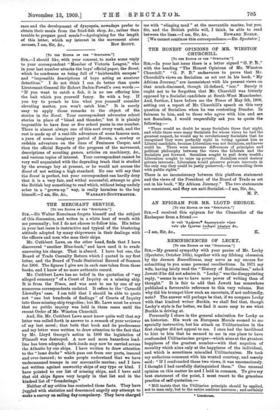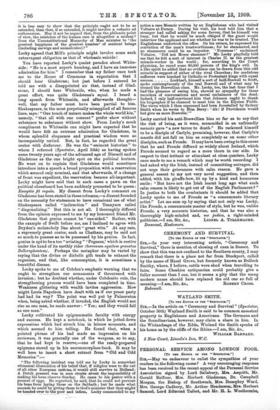REMINISCENCES OF LECKY.
[TO THE EDITOR OP THE " SPECTATOR."] SIR,—My general sympathy with your praise of Mr. Lecky (Spectator, October 16th), together with my lifelong obsession by the daemon. Boswellianus, may serve as my excuse for submitting to you some personal recollections. In 1871 my wife, having lately read the "History of Rationalism," asked Jowett if he did not admire it. " Lecky," was the disappointing reply, "seems to me to have more power of writing than of thought." It is fair to add that Jowett has somewhere published a favourable reference to this very volume. But why did his trumpet blow such an uncertain, if not unfriendly, note ? The answer will perhaps be that, if we compare Lecky with that kindred writer Buckle, we shall feel that, though Lecky's style is far better, we find it more easy to see what Buckle is driving at.
Personally I share in the general admiration for Lecky as an historian. His work on European Morals seemed to me specially instructive, but his attack on Utilitarianism in the first chapter did not appeal to me. I once had the hardihood to hint to him that he seemed to me in one place to have confounded Utilitarianism proper—which aims at the greatest happiness of the greatest number—with that negation of morality which aims only at the happiness of the individual, and which is sometimes miscalled Utilitarianism. He took my audacious comment with his wonted courtesy, and merely said: "If I confounded those two views, it was unconsciously. I thought I had carefully distinguished them." One unusual opinion on this matter he and I held in common. To give my best statement of the point, I must resort to the graceless practice of self-quotation :—
"Mill insists that the Utilitarian principle should be applied, not to man only, but to the entire sentient universe ; and certainly
• Limehouse.
it is less easy to show that the principle ought not to be so extended, than that, if so extended, it might involve a redudio ad euthanasiam. May it not be argued that, from the philozoic point of view, the existence of the human race is altogether a mishap ? Does the Unconstitutional Monarchy of Man minister to the greatest happiness of the greatest number! of sentient beings (including earwigs and animalcules) ?"
Lecky agreed that Mill's principle might involve some such extravagant obligation as that of wholesale suicide!
You have reported Lecky's quaint paradox about White- side : "He is a most superb humbug, and I have an immense admiration for him." I remember that my father once took me to the House of Commons in expectation that I should hear Gladstone; but just before I entered he told me with a disappointed air that, instead of Glad- stone, I should hear Whiteside, who, when he made a great effort, was quite Gladstone's equal. I heard a long speech from Whiteside, and afterwards thought— well, that my father must have been partial to him.
Shakespeare, in the most perpetually misapplied of all famous lines, says: " One touch of nature makes the whole world kin," namely, " that all with one consent" prefer show without substance to substance without show. From Lecky's mock compliment to Whiteside one might have expected that he would have felt an extreme admiration for Gladstone, in whom splendid eloquence and practical wisdom were so incomparably untied. But, in fact, he regarded the great orator with disfavour. He was the " eminent historian " to whom I referred (Spectator, April 10th) as having spoken some twenty years ago of the advanced age of Disraeli and of Gladstone as the one bright spot on the political horizon. Ile went on to explain that Gladstone would sometimes introduce into a speech a broad proposition with a reservation which seemed only nominal, and that afterwards, if a change of front was expedient, the reservation became all-important. Lecky might have said that in such cases a pawn on the political chessboard has been suddenly promoted to be queen: Exceptio fit regula. My dissent from Lecky's comment on Gladstone has been stated in these columns,—a dissent founded on the necessity for statesmen to have occasional use of what Shakespeare called " indirection " and Tennyson called " diagonalizing." But this is not all. I thoroughly differed from the opinion expressed to me by my honoured friend Mr. Gladstone that genius cannot be " one-sided." Rather, with the example of Swift before me, am I inclined to agree with Dryden's melancholy line about " great wits." At any rate, a supremely great orator, such as Chatham, may be said not so much.to possess as to he possessed by his genius. In fact, genius is apt to be a too " aviating " 'Pegasus,' which is restive under the hand of its earthly rider (terrenum equitera gravatus Bellerophontem). Perhaps the metaphor may be varied by saying that the divine or diabolic gift tends to exhaust the organism, and that, like consumption, it is sometimes a beautiful disease.
Lecky spoke to me of Cobden's emphatic warning that we ought to strengthen our armaments if threatened with invasion ; but he doubted whether, under Cobdenite rule, the
Strengthening process would have been completed in time. Weakness glittering with wealth invites aggression.. How might Louis Napoleon have dealt with us if our peace party had had its way ? The point was well put by Palmerston when, being asked whether, if invaded, the English would not
rise as one man, he made answer : " Yes ; and they would fall as one man."
Lecky cultivated his epigrammatic faculty with energy and success. He kept a notebook, in which he jotted down expressions which had struck him in leisure moments, and which seemed to him telling. He found that, when a pointed phrase of his had made an impression on his reviewers, it was generally one of the weapons, so to say, that he had kept in reserve,—one of the ready-prepared epigrams stored up in his wacommonplace-book. It may be well here to insert a short extract from om and Odd Memories ":—
" The following incident was told me by Lecky in somewhat whimsical illustration of his belief that, if religion were to die out of all other European nations, it would still survive in Holland: A Dutch peasant was in sore straits about the impossibility of making his hens observe Sunday. He came to his pastor with.a present of eggs. He regretted, he said, that he could not prevent his hens from laying these on the Sabbath ; but he made what amends he could by giving them to God's minister that they might be handed over to the poor and infirm, Lecky commended to my notice a rare Memoir written by an Englishman who had visited Voltaire at Forney. During his visit, his host told him that a stranger had called asking for some favour, that he himself was busy, but that he would be much obliged if the guest would interview the applicant and see whether he was to be trusted. The Englishman undertook the office. On his return, he expressed his conviction of the man's trustworthiness; for he stammered, and no stammerer could be an impostor. " Nonsense !' exclaimed Voltaire. Did not Moses stammer ?' Mr. Lecky playfully told me that he felt a sort of interest in Charles II. as the greatest miracle-worker in the world ; for, according to the Court physician, he cured some 90,000 persons of the king's evil. In a like spirit he added that no evidence can be drawn from this odd miracle in support of either of the rival Churches ; for credulous sufferers were touched by Catholic or Protestant kings with equal success Lockhart, himself a sort of half-Boswell to Scott, spoke contemptuously of the real Boswell and of what may be termed the Boswellian class. Mr. Lecky, too, the last time that I had the pleasure of seeing him, showed no sympathy for those recorders of conversations and moral embalmers of the dead. Indeed, I only half-convinced him that Johnson ought to thank his biographer if he chanced to meet him in the Elysian Fields. The views which I then expressed had been forestalled by Sydney Smith when he wrote to Miss Berry : Ah! if Providence would but give us more Boswells.' "
Lecky carried his anti-Boswellian bias so far as to say that the risk of being, as it were, mummified in an unfriendly memoir gave "a new terror to death." He reckoned himself to be a disciple of Carlyle, premising, however, that Carlyle's mantle did not fall on him as completely as on some other disciples, such as Fronde. It may have been owing to this cause that he and Froude differed so widely about Ireland, which Froude seemed to regard as a mere thorn in our side. In respect to that irritant or stimulant at close quarters, Lecky once made to me a remark which may be worth recording. I had asked why the Irish, instead of committing outrages, did not urge their grievances with calm reason. He gave a general assent to my not very novel suggestion, and then added, with his giraffe-bow, lit up by a kind and humorous smile : " But have not the Irish learnt long ago what such calm reason is likely to get out of the English Parliament? " In justice to both the combatants it should be added that Lecky spoke to me of Fronde as " a consummate literary artist." Let me sum up by saying that not only was Lecky, like Fronde, a consummate master of style, but he was, unlike Froude, a very accurate historian, and that he was also a thoroughly high-minded and, me judice, a right-minded















































 Previous page
Previous page